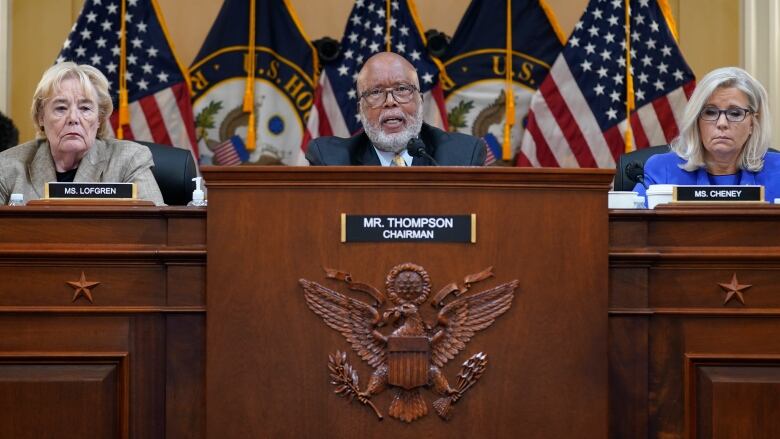Jan. 6 riot hearings offer window into potential charges against Trump
Former president's state of mind key is central issue, says former assistant U.S. attorney

With all the information andwitness testimony heard and seenover three days of hearings into the Jan. 6 riots, perhaps what's most significant is thewindow into potentialcharges that could be laid against former U.S. president Donald Trump.
Based on whatever role Trumpplayed in trying to prevent Congress from certifying the 2020 presidentialelection, those charges could includeconspiracy to defraud the United States and conspiracy to obstruct congressional proceedings.
And the hearings may have provided prosecutors with some legal ammunition, someexpertssuggest.
The central issue is Trump's state of mind, saysRandall Eliason, a former assistant U.S. attorney for the District of Columbia.
"Canheclaim some kind of good-faith belief thatmaybe he really had a legitimate basis to contest the election? Or did he know all along that there was really no basis for it, and he went ahead anyway?"
"And all this evidence about people telling him it was bogus I think there's definitely potential charges there," he said.
In its first three hearings, the House panel investigating the riotlaid out the beginnings of its case against Trump that his lies about the 2020 election, and his pressure on Vice-PresidentMike Penceto overturn it, directly led to the violence on Jan. 6, 2021.
Only the Justice Department, which has been conducting its own investigation, can lay charges, but the House panel can send the departmentcriminal referrals.
The committee has heard from a number of Trump's former top aides, who saidthey told him at the time they didn't believe his claims of electionfraud.
"Thehearings are providingjust this incredible level of detail, and it's coming out of the mouths of the people who were actually there," Eliason said.
"I mean, they just stacked up. There were so manypeople in his own circle So that was awfully important."
Alan Rozenshtein, associate professor of law at the University of Minnesota, said he believesthe hearings have made it clear that Trump knew shortly after the election that he had lostand "decided that he did not care what the truth really was."
"Literally every single person was telling him except for[former New York City mayor Rudy] Giuliani thathe had lost," Rozenshtein said.
"I think that's really important because it goes to the question of motive and intent. Now, there still remains the question,motive and intent to do what?Tocorruptan official proceeding? Toput pressure on people to do something bad?"
That, saidRozenshtein,remains to be established.
That's why the testimony of former attorney general Bill Barr is so key, says Ryan Goodman, a law professor at New York University.
Barr's testimony, presented through a video recording, revealed that he had told Trump there was no evidence of voter fraud, that he didn't agree with the idea of saying the election was stolen yet "there was never an indication of interest in what the actual facts were."
'Very significant' testimony
"That's very significant," Goodman said. "If President Trump knew or was deliberately ignorant that he lost the election, it would be a crime for him to push Pence to interfere with the vote count."
The hearings also heard about a plan by conservative lawyer John Eastman, which hepresented to Trump and which aimed toreverse Joe Biden's election victory. It would pressurePence to reject the voteas he presided over the Jan. 6 joint session of Congress to certify Biden's win.

But Greg Jacob, the vice-president's counsel, testified hefended off Eastman's ideas and that Eastman himself admitted to Trump it would have violated several provisions of federal law.
That was a "bombshell," said Goodman.
As for possible prosecution of Trump, "there'sstill testimony lacking as to the exact state of [his] mind and other details," Goodman said.
"But I still think he has very significant exposure coming out of the hearings so far."
Barbara Perry, director of presidential studies at the University of Virginia'sMiller Center, says it's been important to seemany of Trump's former aides and advisers, who had been supporting him, change their tune.
Now, she said, they're saying:"'Oh, well, no, I wasn't [supporting him].And this is what I was saying to him because he was wrong, absolutely wrong, on the Constitution and its interpretation. He was wrong about any kind of fraud. There was no fraud.'"
But she said the hearings have also been particularly effective in"offering the story, the entire story" of the events leading up to and including Jan. 6.
"[The committee is] putting it together in a somewhat chronological narrative and a pretty compelling narrative," Perry said.
With files from The Associated Press














_(720p).jpg)


 OFFICIAL HD MUSIC VIDEO.jpg)
.jpg)



























































































